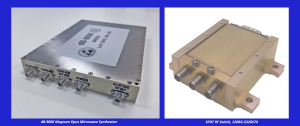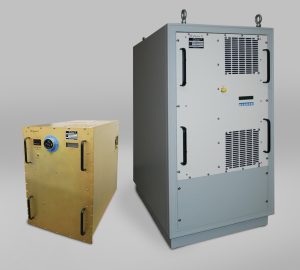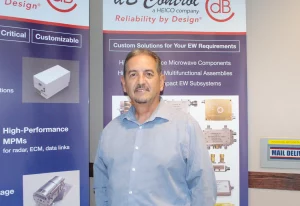Interview with dB Control President Mike England
MPD: If you sell to the defense sector, what do you believe are the major challenges for RF and microwave technology in serving DoD’s needs?
ME: As the Department of Defense (DoD) restructures electronic warfare (EW) efforts, RF and microwave engineers must continue to ensure amplifiers evolve to become even smaller, lighter and more powerful. In addition to these SWaP (size, weight and power) considerations, amplifiers must be highly efficient and maintain consistent thermal management. That’s because high-power amplifiers and microwave power modules (MPMs) often push power limits within a relatively small amount of space. Without proper internal cooling systems like dB Control’s proprietary high efficiency power supply designs and conduction cooling method, an amplifier can overheat and compromise the mission. Another challenge? Shorter lead time. Defense contractors need reliable products as quickly as possible. Manufacturers who have a legacy of stringent, streamlined practices are more equipped to meet this challenge. It’s at this point—where legacy meets innovation—that RF and microwave manufacturers can rise to meet DoD’s needs.
MPD: What RF and microwave technologies will have the greatest impact in the next few years?
ME: Ka-band and millimeterWave (mmWave) frequency devices that can support longer missions more efficiently will have the greatest impact. More robust EW and jammer training onboard unmanned aerial vehicles and faster tactical communication between land or maritime vehicles are good examples. Since military EW training has come under fire recently, demand for these devices will likely increase as DoD gets more proactive. For instance, the U.S. Air Force recently established an EW Enterprise Capabilities Collaboration Team (ECCT) to sharpen its expertise in all facets of the electromagnetic spectrum. Part of the ECCT’s goal could likely be to integrate more mmWave devices to eliminate clutter of RF and microwave frequencies. As high-power amplifiers climb even further into mmWaves, this will ensure the U.S. can face enemy jammers and other threats.
MPD: Is your company having trouble in finding new microwave engineers?
ME: dB Control is fortunate to have a dedicated team of experienced engineers. That said, in Silicon Valley in particular, new microwave engineers are difficult to find. Engineering students want to work at well-known companies like Google and Apple. So they major in computer science or application development. Microwave engineering is not as popular a major, even though the work can be just as exciting. To educate students about the rewards of working in the defense and RF/microwave industries. dB Control has partnered with local colleges.
Original article: https://www.mpdigest.com/2019/12/30/vftt-db-control-3/






